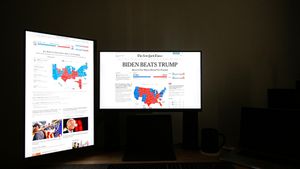The atmosphere at Columbia University has turned electric following the surprise resignation of President Minouche Shafik amid fierce campus protests. This unexpected move has raised eyebrows, mainly because pressure had been building for quite some time over how the university handled recent protests surrounding the Israel-Hamas conflict.
The protests erupted following Hamas's attacks on Israel on October 7, which led to significant casualties and widespread unrest. Students have expressed frustration and concern over the university’s perceived lack of support following these events.
Shafik’s resignation came just as students returned to campus, leading many to believe she might have weathered the storm. After all, the summer was relatively quiet, and some hoped she would ride out the turmoil.
While she cited the toll these events took on her family, she didn’t provide clear reasons for her timing. Observers are left speculating whether the increasing clamor from both students and faculty played any role.
With Shafik’s departure, Dr. Katrina Armstrong, previously the executive vice president for health and biomedical sciences, has stepped up as interim president. Armstrong’s previous experience during the Boston Marathon bombing could offer her some unique insights as Columbia navigates through its own crisis.
Interestingly, this will be Armstrong’s second time stepping up as leader during turbulent times. When she was thrust under the spotlight at Massachusetts General Hospital, she learned how to handle crises effectively.
Armstrong’s inaugural challenge will be to address grievances over alleged antisemitism and the broader climate of conflict stemming from the protests. Her statements, which have previously highlighted the need for compassion and empathy, will surely be scrutinized during her tenure.
The resignation is regarded as part of the larger struggle faced by university administrations across the nation amid rising tensions related to geopolitical issues. Both faculty and student bodies have demanded more responsibility from their leaders during these times.
The school’s board tapped Armstrong, who has drawn favorable responses from various community leaders, including Brian Cohen, executive director of Columbia/Barnard Hillel. Cohen expressed confidence in Armstrong, indicating she has proven leadership skills when addressing pressing matters.
Armstrong previously underscored the importance of drawing distinctions between Hamas as an organization and the Palestinian people, aiming to balance perspectives on campus. Acknowledging the challenging situation presents her first major task for unifying the university community.
Columbia had already restricted campus access prior to Shafik's resignation due to fears of disruptions stemming from protests. The moves highlight how pressing the situation has become, necessitating immediate and effective measures.
The resignation also reflects broader trends, as other institutions have faced similar issues with regard to protests and the accountability of their administrations. University leadership is being called upon to navigate these divisive issues calmly and effectively.
With protests likely to continue as conflict abroad impacts local sentiments, Armstrong's leadership will be indisputably tested from the get-go. The upcoming academic year will shed light on how she manages the myriad challenges presented by both student activism and administrative scrutiny.
Shafik’s departure is emblematic of the growing pressures university leaders face, exacerbated by complex global issues. Many observers will be keeping close tabs on how Columbia transitions under Armstrong's guidance, especially as the situation evolves.
With the backdrop of the Israel-Hamas war continuously affecting student and faculty sentiments, Armstrong has her work cut out for her. Navigational skills will be her strongest asset as she attempts to unify the fragmented community.
How Armstrong plans to redefine the dialogue around these issues could reshuffle the existing dynamics at Columbia. The expectations placed on her will be high, and her initial steps will likely set the tone for her interim presidency.
Columbia is not alone in facing these challenges; many campuses across the nation have felt the fallout from global events spilling onto their grounds. How university leaders respond will be pivotal, shaping the future of discourse on campuses.
Armstrong’s early communications could lay the groundwork for rebuilding trust with students and faculty who have felt marginally heard. The reaction from community stakeholders will be integral as she seeks to establish her authority and credibility as the interim leader.
Expectations are high, and Armstrong's effectiveness as president will come under immediate scrutiny. The university community yearns for clarity, leadership, and most of all, healing during these troubled times.



